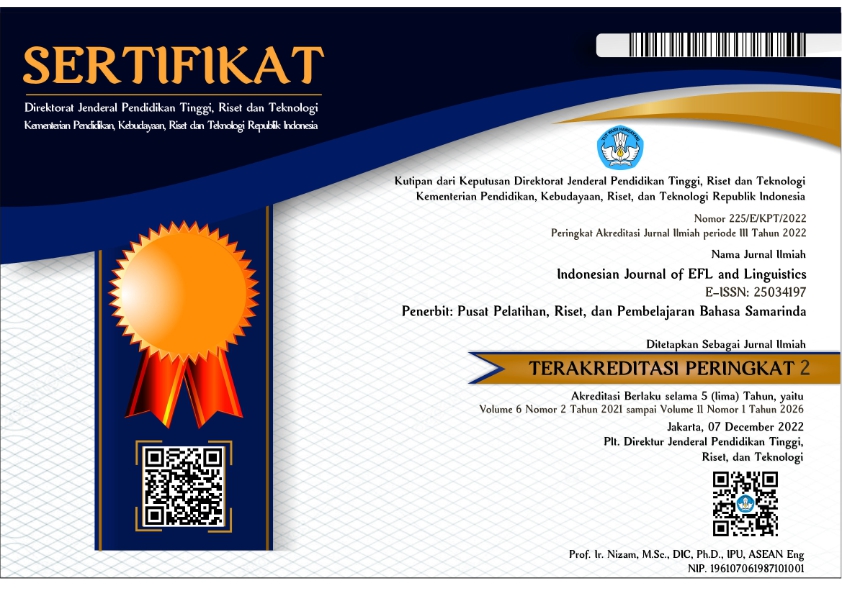Teachers’ Feedback on EFL Writings from Sociocultural Perspective
Abstract
Writing skill is one of the difficult skills to acquire in learning a second language. Therefore, the feedback that the students receive from the teachers should be understandable and improve students’ writing skills. This study examines the teachers’ experiences in giving feedback on students’ writing performance through a sociocultural perspective. The participants of this study were 8 English teachers of junior and senior high schools in Padangsidimpuan, North Sumatra. The data were collected through online interviews and analyzed in a thematic approach by transcribing, coding, categorizing, and interpreting. The result shows that teachers prefer to use teacher-student conferencing in giving writing feedback since joint participation and transaction occur in the learning process. It is compatible with the principle of the sociocultural approach. In addition, teachers are more concerned about students’ grammatical errors rather than structure and content. It is due to students finding it difficult to implement the grammatical rules into their writings. Furthermore, unfocused corrective feedback points out a range of error types. However, the strategy is hard to implement for students with lower proficiency levels.
References
Allahyar, N., & Nazari, A. (2012). Potentially of Vygotsky’s Sociocultural Theory in Exploring the Role of Teacher Perceptions, Expectations, and Interaction Strategies. Journal of Working Papers in Language Pedagogy. 6. 79 – 92. https://www.semanticscholar.org/paper/Potentiality-Of-Vygotsky%27s Sociocultural-Theory-In-Allahyar Nazari/d24078cb40e5fcd3ef954e9f5e7aa1b5bb4aed94
Balbay, S. (2018). Vygotskian Sociocultural Theory of Learning. In D. S. ÜĞÜTEN, Current Pathways in Foreign Language Teaching (pp. 65-72). Turkey: Çizgi Kitabevi. https://www.researchgate.net/publication/329913101_Vygostskian_Sociocultural_Theory_of_Learning
Behizadeh, N. (2014). Mitigating the Dangers of a Single Story: Creating Large-Scale Writing Assessments Aligned With Sociocultural Theory. Educational Researcher, 43(3), 125-136. https://doi.org/10.3102%2F0013189X14529604
Bijami, M. (2016). The Relationship between Teacher's Written Feedback and Students' Writing Performance: Sociocultural Perspective. International Journal of Education & Literacy Studies, 4(1). http://www.journals.aiac.org.au/index.php/IJELS/article/view/2266
Bitchener et al. (2005). The Effect of Different Types of Corrective Feedback on ESL Student Writing. Journal of Second Language Writing. 14, 191–205. https://doi.org/10.1016/j.jslw.2005.08.001
Chen, J. (2019). ‘To Blog, Not to Block’: Examining EFL Learners’ Language Development and Intercultural Competence in the Blogosphere Through the Sociocultural Lens. Literacy Unbound: Multiliterate Multilingual, Multimodal, Multilingual Education 30, 225-245. DOI:10.1007/978-3-030-01255-7_12
Cohen, L. (2007). Research Methods in Education. New York: Routledge.
Danish, J. (2016, September 8). Observing Complex Systems Thinking in the Zone of Proximal Development. 1-20. https://link.springer.com/article/10.1007/s11251-016-9391-z
Fithriani, R. (2019). ZPD and the Benefits of Written Feedback in L2 Writing: Focusing on Students’ Perceptions. The Reading Matrix: An International Online Journal. 19(1). 63-73. https://eric.ed.gov/?id=EJ1214702
Ghabool, N., & Kashef, S. H. (2012). Investigating Malaysian ESL Students' Writing Problems on Conventions, Punctuation, and Language Use at Secondary School Level. Journal of Studies in Education. 2 (3). 130 - 143. https://doi.org/10.5296/jse.v2i3.1892
Grant, R. A. (2007). Developing literacy in second-language learners: Crtique from a heteroglossic, sociocultural, and multidimensional framework. Reading Research Quarterly, 42(4), 598-609. https://www.jstor.org/stable/20068322
Hadi, M., & Zad, S. B. (2019). The Effect of a Socio-cultural Factor on the Organization of Communication Structure among Iranian Teenagers in EFL Context. Applied Linguistics Research Journal, 3(3), 41-50. DOI:10.14744/alrj.2019.94914
Irwin, B. (2017). Written Corrective Feedback: Student Preferences and Teacher Feedback Practices. IAFOR Journal of Language Learning. 3(2). 35 - 58. https://eric.ed.gov/?id=EJ1167256
Kothari, C.R. (2004). Research Methodology Methods and Techniques. India: New Age International.
Lee, I. (2014). Revisiting Teacher Feedback in EFL Writing from Sociocultural Perspectives. TESOL QUARTERLY, 48(1). https://www.jstor.org/stable/43267956
Ma, J. (2018). Usability of Teacher Written Feedback: Exploring Feedback Practices and Perceptions of Teachers and Students. Electronic Journal of Foreign Language Teaching. 15(1). 23 - 38. http://e-flt.nus.edu.sg/
Mao, S., & Peter, C. (2019). Investigating Written Corrective Feedback: (Mis)alignment of Teachers’ Beliefs and Practice. Journal of Second Language Writing 45. 46 - 60. https://doi.org/10.1016/j.jslw.2019.05.004
Mustafa, R. F. (2012). Feedback on the Feedback: Sociocultural Interpretation of Saudi ESL Learners’ Opinions about Writing Feedback. English Language Teaching, 5(3). https://eric.ed.gov/?id=EJ1078925
Nassaji, H. (2015). Qualitative and Descriptive Research: Data Type Versus Data Analysis. Language Teaching Research, 19(2), 129-132. https://doi.org/10.1177%2F1362168815572747
Poorebrahim, F. (2017). Indirect Written Corrective Feedback, Revision, and Learning. Indonesian Journal of Applied Linguistics. 4(2). 184 - 192. dx.doi.org/10.17509/ijal.v6i2.
Rahimi, M., & Naroozisiam, E. (2013). The Effect of Strategies-Based Instruction on the Improvement of EFL Learners’ Writing Quality: A Sociocultural Approach. Sage Open. 1 - 8. DOI: 10.1177/2158244013494222
Rasseai, E. (2017). Tailoring mediation to learners’ ZPD: effects of dynamic and non-dynamic corrective feedback on L2 development. The Language Learning Journal, http://dx.doi.org/10.1080/09571736.2017.1343863
Razali, R., & Jupri, R. (2014). Exploring Teacher Written Feedback and Student Revisions on ESL Students’ Writing. IOSR Journal Of Humanities And Social Science. 19(5). 63 - 70. DOI:10.9790/0837-19556370
Rieber, R.W. (1998). The Collective Works of L.S. Vygotsky Volume 5:Child Psychology. New York: Springer Science+Busnisess Media.
Sermsook et al. (2017). The Impact of Teacher Corrective Feedback on EFL Student Writers’ Grammatical Improvement. English Language Teaching. 10(10). 43 - 49. http://doi.org/10.5539/elt.v10n10p43
Sherman, R. R., & Webb, R. B. (2005). Qualitative Research in Education: Focus and Methods. United Kingdom: Taylor & Francis.
Shooshtari, Z., & Mir, F. (2014). ZPD, Tutor; Peer Scaffolding: Sociocultural Theory in Writing Strategies Application. Procedia - Social and Behavioral Sciences 98. 1771 – 1776. https://doi.org/10.1016/j.sbspro.2014.03.605
Syarifah , E. F., & Gunawan, W. (2015). Scaffolding in the teaching of writing discussion texts based on SFL-genre based approach. English Review, 4(1), (39-53). https://journal.uniku.ac.id/index.php/ERJEE/article/view/306/0
Trong, T. (2011). Teaching Writing Through Genre-Based Approach. BELT Journal, 2(1), 121-136. http://dx.doi.org/10.4304/tpls.1.11.1471-1478
Uysal, N. D., & Yafuz, F. (2015). Teaching English to Very Young Learners. Procedia - Social and Behavioral Sciences, 19-22. http://dx.doi.org/10.1016/j.sbspro.2015.07.042
Zheng, Y & Yu, S. (2018). Student Engagement with Teacher Written Corrective Feedback in EFL Writing: A Case Study of Chinese Lower-Proficiency Students. Assessing Writing 37. 13 - 24. https://doi.org/10.1016/j.asw.2018.03.001
Zhou, A,. & Hu, X. (2017). Tutoring Second Language Learners Within Their Zone of Proximal Development. Creative Dimensions of Teaching and Learning in the 21st Century, 287-294. https://brill.com/view/book/edcoll/9789463510479/BP000030.xml




